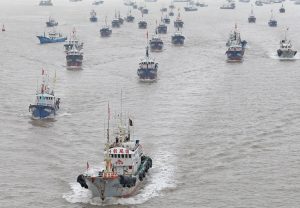Over the last few years illegal, unreported, and unregulated (IUU) fishing has become widely recognized as a national security issue. According to the U.S. Coast Guard’s (USCG) 2020 Strategic Outlook, IUU has replaced piracy as the leading global maritime security threat.
At the IUU Fishing Conference hosted by Florida International University (FIU) in Miami on February 3, USCG Commandant Admiral Karl Shultz said that IUU fishing presents more than just a direct threat to the sustainable management of marine resources; it also threatens global food security, ocean eco-systems, and economic security.
“IUU fishing, when supported as a de facto state policy, that disregards the maritime rules-based order, presents a significant crack in the infrastructure of global norms and the collective good governance that we have relied upon as a global society for a good part of the last century,” Adm. Shultz added.
“IUU fishing, when supported as a de facto state policy, that disregards the maritime rules-based order, presents a significant crack in the infrastructure of global norms and the collective good governance that we have relied upon as a global society for a good part of the last century,” USCG Commandant Admiral Karl Shultz.
Luis Guillermo Solís, former Costa Rican president, moderated the conference with panelists including U.S. Navy Admiral Craig Faller, commander of Southern Command (SOUTHCOM); Ambassador Jean Manes, SOUTHCOM civilian deputy to the commander; Ian Urbina, a noted New York Times investigative journalist who has written extensively on IUU fishing; and Mario Alcaide, a criminal intelligence officer at INTERPOL’s Environmental Security Directorate.
“When Ambassador Manes and I sit with defense leaders here in the hemisphere — this issue, illegal, unreported, unregulated fishing — is in the top three threats that are raised by our counterparts consistently for all the coastal nations, and it’s an issue that affects their food security and their national security, and impacts the United States,” said Adm. Faller. China, he went on to indicate, is one of the biggest offenders of IUU fishing and cited recent examples in Ecuador’s Galápagos Islands and Peru where large swaths of Chinese fishing vessels were positioned outside those countries’ coastal zones for several months in 2020.

These fishing vessels would turn off their AIS tracking system for up to eight hours a day. Adm. Faller said vessels turn off their equipment for only two reasons: either the tracking system is malfunctioning or to conceal illicit behavior. Turning these systems off throughout the day in concert with hundreds of other vessels, does not constitute equipment malfunction.
In December 2020, the USCG, in conjunction with SOUTHCOM and the U.S. Department of State, launched Operation Southern Cross, a multi-month deployment to the South Atlantic to counter IUU fishing, deploying the USCG Cutter Stone. In January 2021, the Stone conducted a series of exercises with the Guyanese Defense Force and in February, partnered with the Brazilian Navy to carry out joint patrols.
During the conference, Ambassador Manes stressed the importance of partnerships in the Western Hemisphere and made the distinction between tracking drug smugglers and IUU fishing perpetrators. Whereas narcotraffickers adjust to where security forces patrol, IUU fishers are easier to track because they follow the migration patterns of fish.
“For example, those same 350 plus vessels we saw last March [2020], they’re on their way back to the Galápagos Islands because they’re following the fish’s migratory patterns,” she said. “And what we saw after the Galápagos incident started last March is agreements with Peru, with Colombia, with Costa Rica, with Ecuador, all joining together because no one country can go after this.”
“If IUU fishing continues to remain unchecked,” Adm. Shultz added, “the world can expect deterioration of fragile coastal states and increased tension among foreign-fishing nations.”









